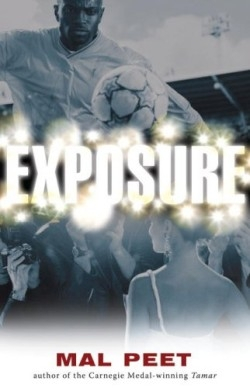
Exposure
Carnegie Medal-winner Mal Peet has accomplished something amazing with his latest novel Exposure; inspired by Shakespeare’s bleak classic, Othello, he reveals the humanity that lies beneath two-dimensional celebrity.
In the rise and fall of soccer phenom Otello, readers find themselves enmeshed in the racial, socioeconomic, and inter-personal tensions that come to life in Peet’s dialogue. Written from numerous perspectives, Exposure explores the myriad ways in which the most famous and most impoverished influence each other.
Otello’s villainous agent, Diego Mendosa, shines as a calculating modern devil. As in Shakespeare’s play, the orchestrations of this antagonist ensnare the well-meaning in guilt and undermine the very location of truth. The corrupt Senator Brabanta, the disapproving father of Otello’s wife Desmerelda (a pop icon in her own right), seethes with racist and political loathing. Throughout the novel, the forces of power, wealth, and fame produce riptides in formerly calm seas.
Peet’s use of the tabloid media in the book expertly portrays the general public’s role in producing and destroying its heroes, calling to mind Shakespeare’s line on jealousy: “It is a Monster / Begot upon it self, borne on it self.” Bending genres, Exposure contains numerous passages written as theater, producing immediacy and verisimilitude.
Perhaps most interesting for those familiar with Othello are Peet’s numerous points of departure from the script. Not content to merely replicate or re-envision the Bard’s work, the author makes use of its central themes and conflicts in surprising ways, bringing a broader cultural context to bear on the characters’ predicaments. Bianca, for example, appears as a homeless young vixen with eyes turned toward the stars, her valiant brother Bush and friend Felicia by her side.
Touted as crossover fiction by its publisher, Candlewick Press, the book certainly provides ample analytical depth for teens and adults alike. Blending reality (mentions of renowned soccer star David Beckham, for example) with fiction serves to further Peet’s provocative analysis of contemporary mythology and its impact on all participants—willing or not. To be careful what one wishes for, and to remember, in the words of Shakespeare’s Cassio, “there be souls must be saved, and there be souls must not be saved,”—these are the points of light that ultimately emerge from the darkness evoked in Exposure.
Reviewed by
Patty Comeau
Disclosure: This article is not an endorsement, but a review. The publisher of this book provided free copies of the book to have their book reviewed by a professional reviewer. No fee was paid by the publisher for this review. Foreword Reviews only recommends books that we love. Foreword Magazine, Inc. is disclosing this in accordance with the Federal Trade Commission’s 16 CFR, Part 255.
